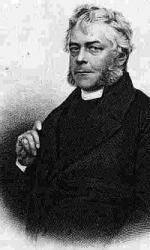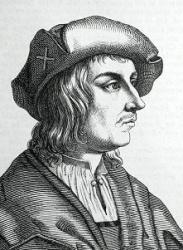Planning worship?
Check out our sister site, ZeteoSearch.org,
for 20+ additional resources related to your search.
- |
User Links
Person Results
Sir Walter Scott

1771 - 1832 Person Name: Walter Scott Author of "That Day Of Wrath, That Dreadful Day" in American Lutheran Hymnal Walter Scott was born in Edinburgh, August 15, 1771. In 1786, he commenced his apprenticeship as writer to the Signet. In 1796, he first appeared before the public in a translation of Burger's "William and Helen." Many poetical works followed, until in 1814, he began the series of "Waverly Novels." He died at Abbotsford, September 21, 1832. It is related that on his death-bed he distinctly repeated portions of the Latin original, upon which "That day of wrath, that dreadful day" is based.
--Annotations of the Hymnal, Charles Hutchins, M.A., 1872
======================
Scott, Sir Walter, Bart., was born in Edinburgh, Aug. 15, 1771, and died at Abbotsford, Sept. 21, 1832. Although so successful and widely known as a poet, he made no direct contributions to hymnody whatever. His condensed rendering of the “Dies Irae", and his hymn of Rebecca in Ivanhoe, "When Israel of the Lord beloved" (q.v.) were utilized as hymns for congregational use by others, but were never intended for such a purpose by himself. His work and rank as poet, novelist, and historian are fully set forth in his Life by J. G. Lockhart.
--John Julian, Dictionary of Hymnology (1907)
Sir Walter Scott
David E. Ford

1797 - 1875 Person Name: Daniel E. Ford Author of "How vain is all beneath the skies!" in The Wesleyan Methodist Hymnal Ford, David Everard, son of a Congregational Minister at Long Melford, was born there on Sept. 13, 1797. He became pastor of the Congregational Church at Lymington, in Oct. 1821; Travelling Secretary to the Congregational Union in 1841; and pastor of Greengate Chapel, Salford, Manchester, in 1843. He died at Bedford, Oct. 23, 1875. Mr. Ford published several works including, Hymns chiefly on the Parables of Christ, 1828. From this is taken, (1) "Earthly joys no longer please us" (Heaven Anticipated). (2) "How vain is all beneath the skies" (Heaven Anticipated). These are in American common use. See Hymns of the Church, 1869, and Laudes Domini, 1884. Another of his hymns in common use from the same work, p. 107, is:—"Almighty Father, heavenly Friend" (Old and New Year). This is in Dale's English Hymn Book, 1874.
--John Julian, Dictionary of Hymnology, Appendix, Part II (1907)
David E. Ford
Lazarus Spengler

1479 - 1534 Author of "Our nature fell in Adam's fall" in Evangelical Lutheran hymnal Spengler, Lazarus, was the 9th of the 21 children of Georg Spengler and Agnes his wife, and was born March 13,1479, at Nürnberg, where his father was clerk of the Imperial court of Justice (Landgerichtschreiber). He entered the University of Leipzig in 1494; but on the death of his father on Dec. 27, 1496, he returned to Nürnberg, obtained a position in the town clerk's office, in 1507 became himself town clerk (Raths Syndikus), and in 1516 also Rathsherr. When Luther was passing through Nürnberg, in 1518, on his way to Augsburg, Spengler made his acquaintance. He warmly espoused the Reformation doctrines, published in 1519 his Schutzre in Luther's favour, and himself became one of the leaders in the Reformation work at Nürnberg. He was one of those condemned by name in the Bull of Excommunication launched by Pope Leo the Tenth, on June 15, 1520, against Luther and his friends. Dr. Eck sent the Bull to the Town Council of Nürnberg, and urged them to proceed against Spengler, but they ignored it, and then sent him as one of their representatives to the Diet of Worms, in April 1521. In 1525 Spengler went to Wittenberg to consult with Luther and Melanchthon as to turning the Benedictine Aegidienstift (Schottenkloster) into an Evangelical Gymnasium, and this was opened as such by Melanchthon on May 23, 1526. Spengler was also the prime mover to the Visitation of 1528, and upheld strict Lutheranism in the negotiations at the Diet of Augsburg in 1530. He died at Nürnberg, Sept. 7, 1534 (Koch, i, 308 ; Will's Nürnbergisches Gelehrten-Lexikon, iii., p. 731; Herzog's Real-Encyklopädie, xiv., 516).
Spengler was a trusty friend and valued counsellor of Luther and the principal Reformers of Germany. He also interested himself in the improvement of the church services, and in 1532 was able to have an authorised Liturgy (Kirchenordnung) printed. He wrote a considerable quantity of verse, sacred and secular ; but only two hymns are ascribed to him.
The one is an indifferent version of Ps. cxxvii., beginning "Vergebens ist all Müh und Kost." The other is:—
Durch Adams Fall ist ganz verderbt. Fall and Redemption. First published in the Geystliche Gesangk Buchleyn, Wittenberg, 1524, and thence in Wackernagel, iii. p. 48, in 9 stanzas of 10 lines…During the Reformation period it attained a wide popularity as a didactic and confessional hymn of the Evangelical faith. It is one of the most characteristic hymns of the time, conceived in the spirit of deep and earnest piety, eminently Scriptural, and setting forth the Reformation teachings in concise and antithetical form, but is however too much like a system of theology in rhyme.
The translations are:—- 1. "By Adam's fall was so forlorne." By Bishop Coverdale, 1539, reprinted in his Remains, 1846, p. 556. 2. "When Adam fell our total Frame." By J. C. Jacobi in his Psalmodia Germanica, pt. ii., 1725, p. 17. [Rev. James Mearns, M.A.]
--Excerpts from John Julian, Dictionary of Hymnology (1907)
Lazarus Spengler
M. N. Hutchinson
1835 - 1935 Person Name: Merrill Hutchinson Translator of "¡Piedad! oh santo Dios" in Himnos de la Iglesia Merill N. Hutchinson.
As of 1871, Hutchinson was pastor of a Presbyterian church in Dunellen, New Jersey. In 1873, he resigned his pastorate and moved to Mexico City. His works include:
Himnario de las Iglesias Evangelica
Translations--
Amoroso Salvador
Con Cánticos, Señor
Hay una Fuente sin Igual
Obediente a Tu Mandato
© The Cyber Hymnal™ (www.hymntime.com/tch)
M. N. Hutchinson
John Edgar Park
1879 - 1956 Author of "O Christ, whose love hast sought us out" in Hymnal for Colleges and Schools J. Edgar Park, until his retirement in 1944, was President of Wheaton College, Massachusetts. He was born in Belfast, Ireland, March 7, 1879 and had his theological studies at New College, Edinburgh, The Royal University, Dublin, and Princeton Theological Seminary. His principal pastorate was in the Second Church of Newton, Congregational, West Newton, Massachusetts, which he served 1926 to 1944, going from there to the Presidency of Wheaton. He is the author of many books, including one of the Lyman Beecher Lectures at Yale. He wrote one of the "Eleven Ecumenical Hymns," entitled "O Christ whose love has sought us out," which were obtained by the Hymn Society for use at the Evanston Assembly (1954) of the World Council of Churches.
--Fourteen New Rural Hymns. Used by permission.
John Edgar Park
Shududi, As'ad
1826 - 1906 Person Name: اسعد الشدودي Author of "يا أيها الخاطيء هل" in كتاب الترانيم الروحية للكنائس الإنجيلية Asaad Ibrahim alShdudi, 1826-1906
A Lebanese-born Mathematician, who studied and later worked at the American University of Beirut.
أسعد إبراهيم الشدودي
Shududi, As'ad
J. H. Kuhlmann
Person Name: J. H. Kuhlman Author of "Bowed Down Beneath A Weight Of Woe" in American Lutheran Hymnal Johann Heinrich Kuhlmann (John Henry) studied at Capitol University and preached at the Lutheran Church in Loudinville, Ohio. Along with his brother Rev. Edward Kuhlman (Oil City, Pa.) he painted frescoes inside rural Ohio churches.
J. H. Kuhlmann's great granddaughter
J. H. Kuhlmann


 My Starred Hymns
My Starred Hymns

